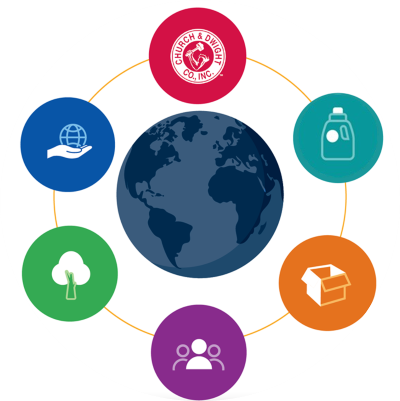We began in 1846 as a baking soda business. Today, we are a top-tier Consumer Products Company with a large portfolio of brands that consumers love, especially the ARM & HAMMER® brand. Since 2022, we have invested approximately $450 million in U.S. capital expenditures, primarily to increase manufacturing capacity. Major projects, including new production lines, advanced automation systems, and expanded warehouse capacities, have significantly enhanced operational efficiency and created new jobs. These strategic investments highlight our commitment to the sustainable expansion of U.S. based manufacturing operations.
We have a rich heritage of commitment to people and have long regarded ourselves as a friend of the environment. Over 100 years ago, we began using recycled materials in our cartons. We were the first U.S. manufacturer to remove phosphates from laundry detergent, and one of the first corporate sponsors of the inaugural Earth Day in 1970.
Church & Dwighters are goal-oriented people. To create a compass for our Sustainability Program, we have established aggressive goals. Our efforts are directed toward improving the sustainability profile of our operations and products, positively impacting our employees and the communities in which we operate and minimizing the environmental impact of our expanding global operations.
We are actively working toward increasing renewable energy usage at our facilities; reducing water consumption, greenhouse gas emissions, and solid waste to landfills; using environmentally responsible packaging; and improving our suppliers’ sustainability practices. In 2024, we continued to procure 100% of our operations’ global electricity from renewable sources, inclusive of renewable energy credits.
For the third year in a row, we achieved carbon neutrality for our ARM & HAMMER Baking Soda by measuring its carbon footprint and reducing it to zero through verified carbon offsets and internal emission reductions in line with The CarbonNeutral Protocol.
Our application to the Science Based Targets Initiative was approved in 2022. In 2024, our absolute direct emissions from our operated facilities (Scope 1), indirect emissions from our operated facilities, e.g., electricity and steam purchases (Scope 2), and emissions associated with transport of our finished products to our first point of customer contact (in the U.S. and Canada) and corporate business travel (targeted Scope 3) was essentially flat compared to 2023.
We are committed to providing global consumers with high-quality products and ingredients in compliance with all safety and regulatory requirements. We have developed a master list of Chemicals of Concern derived from global regulations, scientific reviews by authoritative bodies, and retailer restricted substance lists, and we continuously review ingredients in our product formulations against that list.
We are continuing to pursue our strategy to minimize our environmental impact by reducing plastic from our packaging wherever practical by incorporating non-plastic alternatives, reducing plastic weight, improving recyclability, and enhancing circularity by increasing the amount of post-consumer recycled plastic in our packaging. Our goal is to increase post-consumer recycled plastic over time. Over 22.9% of our plastic packaging is post-consumer recycled content (up from 17% in 2022).
With more than 5,700 employees across more than 50 locations around the world, the safety and wellness of our employees is a top priority. We are also dedicated to maintaining a culture of belonging at Church & Dwight. We support several Employee Resource Groups (ERGs), which are open to all employees, and contribute to building and maintaining a safe and inclusive environment where all our employees feel connected, valued and inspired. We embrace our employees' diversity across all dimensions and believe a diverse and inclusive workforce fosters innovation and cultivates an environment filled with unique perspectives, talents, and experiences. We are an equal employment opportunity employer.
We take great pride in fostering an enduring culture of doing well by doing good. By focusing on making meaningful contributions, each of us can create a stronger, more resilient company while making a positive impact. We matched, dollar for dollar, donations our employees made to the Church & Dwight Employee Giving Fund (EGF), an employee-run giving program that primarily supports charitable organizations where our employees work and live. In 2024, the EGF supported our communities by providing approximately $1.3 million to 237 deserving community organizations through annual grants, disaster relief, and other monetary support. Additionally, the Church & Dwight Philanthropic Foundation (the “Foundation”) granted eight organizations $1.3 million in the aggregate. Established in 2020, the Foundation is administered by our employees and focused on helping to create educational and employment opportunities and advancing environmental preservation.
We earned public recognition for our sustainability efforts in 2024, including being listed in Time Magazine’s Ranking of the World’s Most Sustainable Companies, Newsweek Magazine’s Ranking of America’s Most Responsible Companies, USA Today’s Ranking of America’s Climate Leaders, EPA’s Safer Choice Partner of the Year, FTSE4Good Index Series, amongst others.
While we have made significant progress, we missed some of our goals. In 2024, we achieved a 4% reduction in water intake normalized per million units of product shipped against our annual goal of 10%. Our total waste generation increased by 10% compared to 2023, missing our 10% annual reduction goal. We will continue to make incremental progress as we look forward.
As we look ahead, our roadmap will enable the company to become stronger and more sustainable.
Please read this Report to see the progress we have made over the past year to make Church & Dwight an even better company.

Rick Dierker
President and Chief Executive Officer












